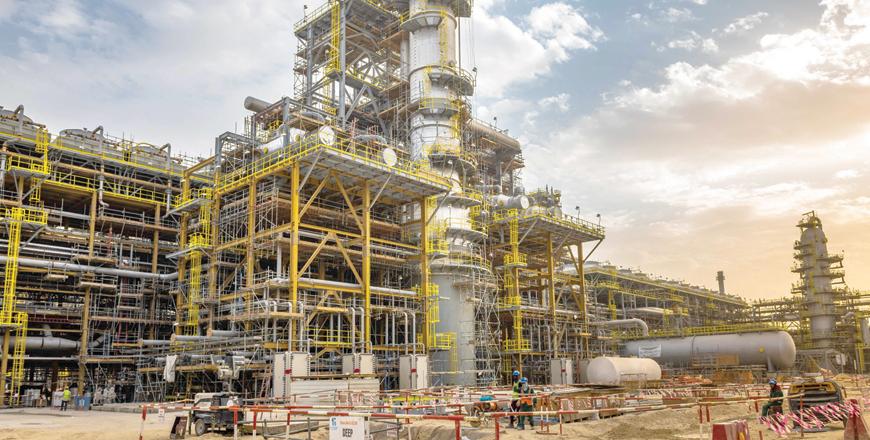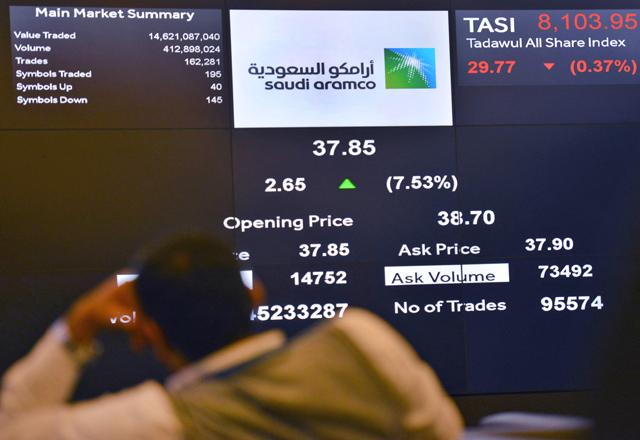You are here
Saudi Aramco, BlackRock sign $15.5b gas pipeline deal
By AFP - Dec 07,2021 - Last updated at Dec 07,2021

This file photo taken on January 16, 2019 shows Aramco’s Fadhili Gas Plant Project, located 30 km west of the city of Jubail in the eastern province of Saudi Arabia (AFP photo)
RIYADH — Saudi Aramco said it has signed a $15.5 billion lease and leaseback agreement for its gas pipeline network with a consortium led by BlackRock Real Assets and Hassana Investment Company in its second major infrastructure deal this year.
The deal signed on Monday underscores how Aramco is seeking to monetise its once-untouchable assets to generate revenue for the Saudi government as it accelerates efforts to diversify the oil-reliant economy.
In June, Aramco sold a 49 per cent stake in its oil pipeline business to a consortium led by US-based EIG Global Energy Partners for $12.4 billion.
Under the new deal, a newly formed subsidiary, Aramco Gas Pipelines Company, will lease usage rights in Aramco's gas pipeline network and lease them back to Aramco for a 20-year period, the Saudi oil firm said in a statement.
In return, Aramco Gas Pipelines Company will receive a tariff payable by Aramco for the gas products that flow through the network, backed by minimum commitments on throughput.
Aramco will hold a 51 per cent stake in Aramco Gas Pipeline Company and sell a 49 per cent stake to investors led by BlackRock and Hassana, a Saudi state-backed investment management firm.
"With gas expected to play a key role in the global transition to a more sustainable energy future, our partners will benefit from a deal tied to a world-class gas infrastructure asset," Aramco President and CEO Amin Nasser said in a statement.
"BlackRock is pleased to work with Saudi Aramco and Hassana on this landmark transaction for Saudi Arabia's infrastructure," BlackRock Chairman and CEO Larry Fink said.
"Aramco and Saudi Arabia are taking meaningful, forward-looking steps to transition the Saudi economy toward renewables, clean hydrogen and a net zero future."
Aramco, the world's biggest oil producer, has pledged to achieve net zero carbon emissions in its operations by 2050.
Saudi Arabia has also pledged to achieve net zero carbon emissions by 2060.
"Saudi Arabia is restructuring Aramco by exiting sectors and focusing on and investing in others, such as hydrogen production," Cairo-based independent analyst Mahmoud Negm said.
"The shift is happening in a non-abrupt manner, with Aramco maintaining 51 per cent stake and clear agreements that no restrictions can be placed on it."
According to Ibrahim Al Ghitani, from the Abu Dhabi-based Future for Advanced Research and Studies, the kingdom is restructuring to generate liquidity and attract foreign investments.
"Saudi Arabia is not completely abandoning these assets... but continues to maintain the status quo of control," Ghitani said.
"It is trying to change the local economy's image... with messages and signs that it continues to open the economy for the private sector and foreign investors."
Long seen as the kingdom's "crown jewel", Aramco and its assets were once under tight government control and considered off-limits to outside investment.
But as Crown Prince Mohammed Bin Salman, is pushing to implement his "Vision 2030" reform programme, the kingdom has shown readiness to cede some control.
Aramco sold a sliver of its shares on the Saudi bourse in December 2019, generating $29.4 billion in the world's biggest initial public offering.
Related Articles
RIYADH — Saudi Arabia has moved four per cent of Aramco shares worth 80 billion dollars in the world's biggest oil exporter to the kingdom's
RIYADH — A former employee of Saudi state oil company, Aramco, received a bribe in return for the purchase of airplanes from Embraer SA of B
RIYADH – The new energy minister of Saudi Arabia, the world's biggest oil exporter, on Sunday pledged continuity in the kingdom's oil policy
















